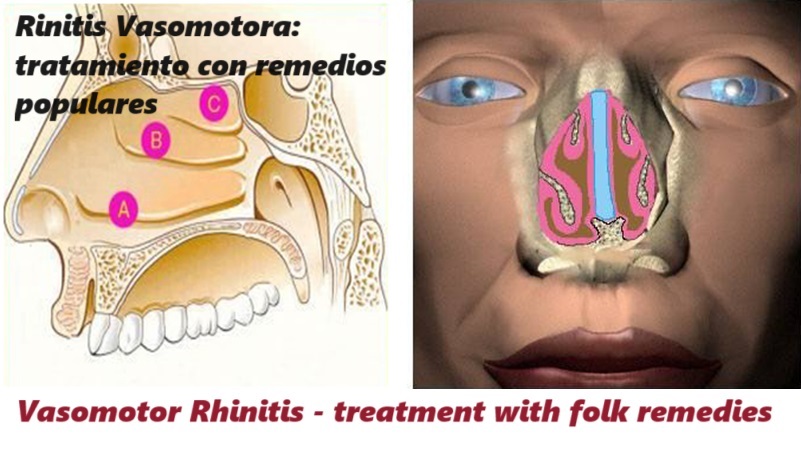Only treatment of vasomotor rhinitis with folk remedies can relieve a person from discomfort and pain, as pharmaceuticals often lead to habituation and cease to have a positive effect on the nasopharynx, but allowing the disease to progress is also not advisable, as untreated vasomotor rhinitis can become chronic, further worsening the patient’s condition.
Vasomotor rhinitis – types, causes, symptoms
Rhinitis is often common in people with vegetative disorders such as hypotension, vegetative-vascular dystonia, and endocrine system disorders. Rhinitis also often arises from nervous disorders.
In this condition, the function of the vessels of the nasopharynx is disrupted, and instead of absorbing mucus, they produce an excessive amount. In other words, the patient constantly feels unwell. Additionally, the nasal passages fail to perform the important function of air purification from harmful substances (dust, microbes, and allergens). Moreover, the nasal passages narrow, resulting in insufficient airflow to the lungs, further complicating the situation.
For successful treatment of vasomotor rhinitis with folk remedies and medications, it is important to distinguish between the types of this condition.
Rhinitis can be:
• Allergic. It can be caused by various allergens present in inhaled air.
• Neurovegetative. It can occur due to frequent use of vasoconstrictor nasal drops, endocrine system disorders, and nasal membrane injuries. The neurovegetative form is more common in children with nervous system disorders.
Causes of vasomotor rhinitis
Frequently, viral infections are the cause of rhinitis. While the infections pass with time, the mucus they cause sometimes stagnates, and the infection can also become chronic, leading to vasomotor rhinitis.
The main causes of vasomotor rhinitis include:
• Viral infections;
• Severe stress;
• Hormonal changes during pregnancy;
• Inhalation of dust, smoke, and strong odors.
A slightly different cause leads to the development of the condition in children. For them, conditions such as adenoids, deviated nasal septum, and sinus inflammation are characteristic. However, correcting these nasal defects almost always leads to the disappearance of vasomotor rhinitis in children.
Symptoms of vasomotor rhinitis
Rhinitis is characterized by abundant mucus discharge, nasal congestion, constant sneezing, and tearing.
Symptoms of rhinitis include:
• Loss of smell;
• Constant nasal congestion and dryness;
• Sleep disturbances;
• Fatigue;
• Sneezing.
Importantly, breathing difficulties in vasomotor rhinitis lead to poor lung ventilation, which in turn causes further disturbances in the functioning of the nervous and other body systems.
Treatment of vasomotor rhinitis
An effective way to help a patient with the onset and prolonged course of the disease is the use of folk remedies for the treatment of vasomotor rhinitis. They do not cause habituation or rejection, and besides aiding in the treatment of the specific condition, they also provide a general strengthening effect.
Medicinal treatments for the condition mostly include drops and sprays, to which individuals often become accustomed over time, resulting in them ceasing to provide the necessary impact.
Treatment of rhinitis using the Buteyko method yields good results. Although this method was developed for treating asthma, it also appears to be suitable for treating rhinitis, at least according to the treatment statistics of many patients using the Buteyko method.
There is also treatment for rhinitis through homeopathy, but in this case, the success statistics are unknown, and it’s not advisable to make any claims about the effectiveness of homeopathic treatment without reliable data.
Treatment of vasomotor rhinitis with folk remedies
For those suffering from rhinitis, in addition to taking herbal infusions, teas, etc., continuous nasal training is recommended. This is necessary to reduce the sensitivity of the nose to temperature changes, various beverages, dust, etc.
To achieve this, a compress of warm water is applied to the nose, gradually lowering its temperature. However, it’s not recommended to keep the water compress for more than five minutes! After removing the cloth with water, the nasal area should be thoroughly rubbed.
Proven folk remedies for treating rhinitis:
Massage. Massage should be performed daily along with the intake of herbal infusions. It involves gently tapping the nostrils and maxillary sinuses with the fingertips. This helps to facilitate mucus drainage.
Walnut. A 10% ointment is made from walnut leaves based on vaseline. It should be stored in a cool place, preferably in the refrigerator. The nasal mucosa should be lubricated with this ointment three times a day.
Birch juice. Dripped into the nose and taken orally.
Beetroot. Fresh beetroot is grated and the juice is collected, which should be stored in the refrigerator. Three drops should be instilled into each nostril three times a day. After instillation, tampons moistened with beet juice are also placed in the nose.
Honey. Honey is dissolved in warm water (1 tablespoon per glass of water), and this solution should be used to rinse each nostril. Honey destroys harmful microflora.
Herbal blends:
Variant #1. Mix 2 tablespoons of horsetail, 3 tablespoons of dandelion root, 4 tablespoons of yarrow, 1 tablespoon of corn silk, and 5 tablespoons of goldenrod. Crushed rose hips are also added. Then, one tablespoon of the mixture is brewed in one-third liter of water. The infusion is left for 12 hours. Then it is boiled, cooled, and filtered. Drink one-third of a glass three times a day. The infusion should be stored in the refrigerator.
Variant #2. Mix 50 grams of valerian root and elecampane root, 100 grams each of coltsfoot, pansies, and marsh cinquefoil, and 150 grams of cypress seed. A tablespoon of the mixture is infused in 250 grams of boiling water overnight. In the morning, filter it. Take two tablespoons three times a day before meals, and the fourth time before bed.
Variant #3. Mix 30 grams of oak bark, 20 grams of Skumpia leaves and hawthorn berries, 15 grams of field horsetail, and 5 grams each of sage and mint leaves. Two tablespoons of the mixture are brewed in a glass of water, boiled for 10 minutes. After infusing for 1 hour, you can rinse the nasal sinuses twice a day.
Treatment of vasomotor rhinitis with folk remedies shows excellent results. However, regular medical supervision is still necessary!






